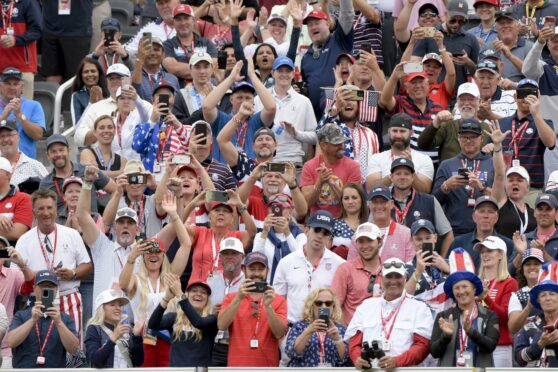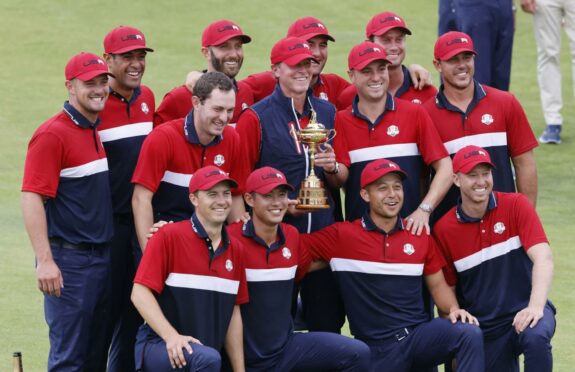We in Europe should be glad that the United States are finally taking the Ryder Cup supremely seriously. But we should not be scared of it.
The 19-9 defeat at Whistling Straits (“Dire Straits”, indeed) stings, of course. Although we didn’t think it would be to a record scale, defeat was largely expected. I suspect even among some of the European hierarchy.
Some in the US now think this young American team can dominate for decades. Fine. That’s the sort of American hubris that has fed European triumphs since 1985.
I produce in evidence Anthony Kim, Hunter Mahan, Jeff Overton, Keegan Bradley, Jason Duffner, and Ryan Moore. All at one point the potential “cornerstones of US Ryder Cup teams for years to come”, all now pretty much nowhere.
The rankings problem
Team USA captain Steve Stricker heralded "a new era" for US golf after overseeing a 19-9 demolition of Europe at the #RyderCup
— Sky Sports Ryder Cup (@SkySportsGolf) September 27, 2021
Europe does have some issues which will make things difficult. The European Tour has suffered in the pandemic and its events do not now produce adequate world ranking points.
It’s not really a problem that more US players are higher-ranked – anyone can beat anyone in matchplay. But it does matter when entry into the best events is governed by world ranking.
It’s presently harder for young European players to progress to regular major appearances and even achieve PGA Tour cards, thereby attaining Ryder Cup spots.
But the US has always had “better” players in terms of rankings. Europe has still won seven of the ten played this century. I think the Ryder Cup has settled into a natural way – bolstered by course set-up – that winning away from home has become really hard.
Medinah the only away win in eight editions
Marco Simone Golf & Country Club
Rome, ItalySeptember, 2023. pic.twitter.com/nmz7cVzxBK
— Ryder Cup Europe (@RyderCupEurope) September 27, 2021
This column has been droning on for some time that the only away win in the last eight was Medinah in 2012, and we don’t need reminding of the circumstances then.
This year, winning for Europe was at its hardest. Covid affected not only fan attendance, but the qualification process left Padraig Harrington with an ageing team.
The pandemic also meant the usual grind of Ryder Cup week was absent and Steve Stricker was able to placate the egos in his team room by deferring to them. That’s unlikely to happen in Rome.
Here’s some other points worth considering from the weekend’s action.
An (overdue) changing of the guard
When Harrington was appointed captain, as T2G noted above, it was easy to detect his reticence about it. He talked putting his legacy in the game on the line – a curious approach, basically admitting he was scared of losing.
Perhaps he knew what was inevitable. The US have found that Task Forces are less effective than removing some poisonous egos and plodding mediocrities, replacing them with young, hungry players of some quality.
Europe needed new blood as well. Paris was really the end of the line for a few.
But picking three young rookies as wildcards was never an option for Harrington. He’d have been second-guessed to smithereens, even if the result was always going to be the same.
Two of Europe’s rookies were Bernd Wiesberger at 35 and Shane Lowry at 34. It’s perhaps an indictment of the younger breed on the European Tour that they did not load the qualifying places. But the European’s Tour’s pandemic struggles and tiny Covid prizefunds throughout this process didn’t help.
Taking Victor Perez or Rasmus Hojgaard or Guido Miglozzi or Tom Detry or yes, Robert MacIntyre might have been a stretch. They or their likes will be needed for Rome.
Can you really see Westwood or Casey or Poulter or even Sergio playing there now? Would you even want them?
Paddy really did do as well as he could
Captain Pádraig Harrington reflects on defeat.#TeamEurope #RyderCup pic.twitter.com/uWqQWBAy5f
— Ryder Cup Europe (@RyderCupEurope) September 26, 2021
You’ll get the usual positive platitudes about the captain in the aftermath. This time they’re probably right.
With the dice so loaded against him, there’s little Harrington could do. If there’s one criticism, and it’s mild, it’s that he was too rigid with his pre-prepared pairings.
Otherwise he stuck to the template and was cognisant of the stats, the way Paul McGinley and Thomas Bjorn did. There were plenty of those inspirational videos that made you want to run through a wall. There was surely no better prepared captain taking a European team to the US.
His team simply didn’t hole as many putts and make birdies at the rate of the US. Part of that was, of course, down to…
The set-up
A great Sunday on deck at Whistling Straits.#RyderCup pic.twitter.com/zHVpkOfGkX
— Ryder Cup (@rydercup) September 26, 2021
This has now got pretty much out of hand. Each side doctors their home course to suit their team, accentuating home advantage beyond what is reasonable.
The Ryder Cup should employ a commissioner – Australian or Asian perhaps – to make the course neutral. Something between the thick rough and squeaky-thin fairways of Paris and the shorn-back racetracks of Hazeltine and Whistling Straits.
Somebody’s going to have to be the big guy and go first with this, obviously. After you…
The fans

A massive advantage for the US. Their team was buffeted from nerves by the vocal galleries.
As for their behaviour, if you were shocked, you have selective memory. There was booing and cheering at errant shots in Paris, although not nearly to the same scale.
I watched the US TV feed a bit and there was zero reference to bad behaviour – in fact unanimous praise at the backing for the US team. They seemed to think the crowd is a reflection of the unique nature of the Ryder Cup.
Reluctantly, I tend to agree. Times and social attitudes have changed. It’s not realistic to think all the old courtesies of golf can be immune, at least in this event, however much we wish they were.
Since the gloves are off, we shouldn’t be holier-than-thou. It’s probably time for the European crowds to properly wind it up in Rome.
